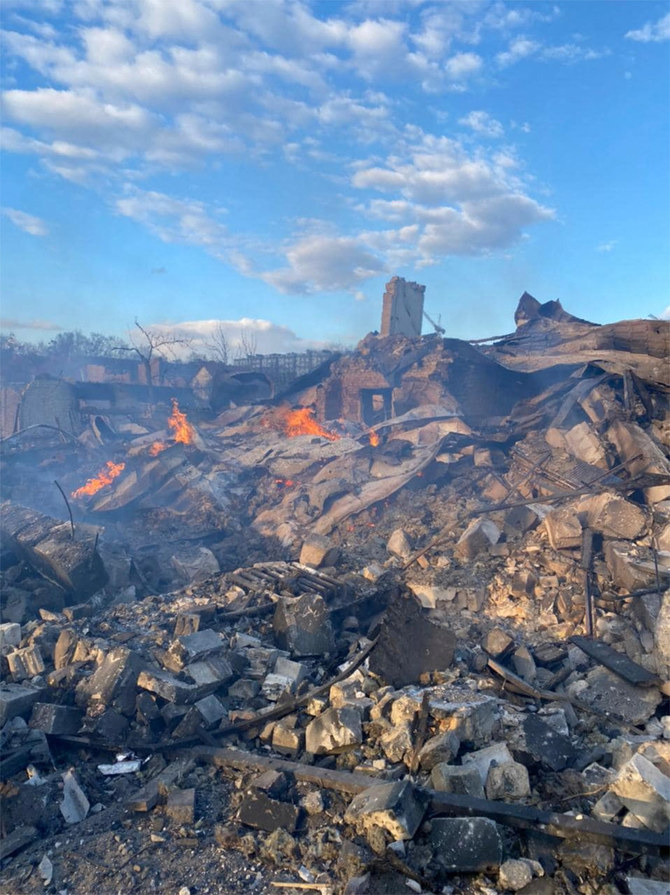IRBIL, Iraqi Kurdistan: As Russia’s invasion of Ukraine enters its fourth day, what is for certain is that the geopolitical repercussions will be felt far away from the European operational theater. Analysts say Ukraine’s grim fate may well have long-term implications for future nuclear disarmament efforts, including in the Middle East.
When the Soviet Union collapsed in 1991, Ukraine gained its independence. Along with Belarus and Kazakhstan, Ukraine inherited a huge arsenal of intercontinental ballistic missiles, bombers and, more crucially, nuclear warheads, which it gave up.
The government of former president Leonid Kravchuk agreed in 1994 to completely dismantle that arsenal, one of the largest in the world at the time, as part of the Budapest Memorandum, which included security assurances for protecting Ukraine’s territorial integrity and political independence in return.
The full title of that agreement was the “Memorandum on security assurances in connection with Ukraine’s accession to the Treaty on the Non-Proliferation of Nuclear Weapons.”
Despite all this, Russian tanks are now rolling into Kyiv to topple Ukraine’s democratically elected government, ostensibly for its pro-Western orientation. Ukraine, which aspires to be a member of both the EU and the NATO, is receiving insufficient support and assistance from Western countries to stop the Russian military juggernaut.
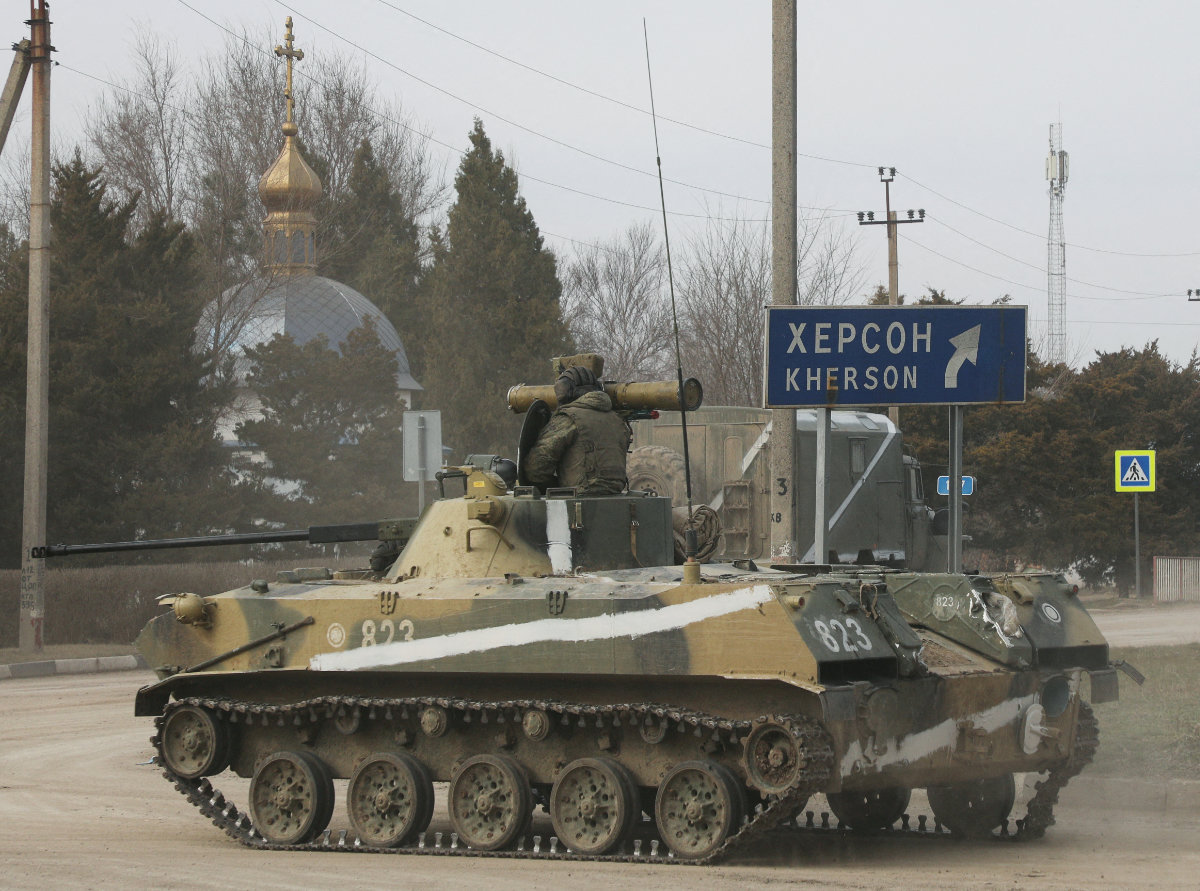
A Russian military armored vehicle drives along a street in Armyansk, Crimea, after Russian President Vladimir Putin authorized a military operation into Ukraine on Feb. 24, 2022. (REUTERS)
Some argue that former Libyan dictator Muammar Gaddafi made a similar mistake when he surrendered his substantial stockpile of weapons of mass destruction to the West in 2003, only to be toppled by, and killed in, a popular armed uprising that was given decisive NATO air support less than a decade later.
Ukraine, however, could set a precedent altogether different from serial human rights-violating pariah states such as Gaddafi’s Libya, Saddam Hussein’s Iraq or North Korea. It is a democratic and genuinely pro-Western country.
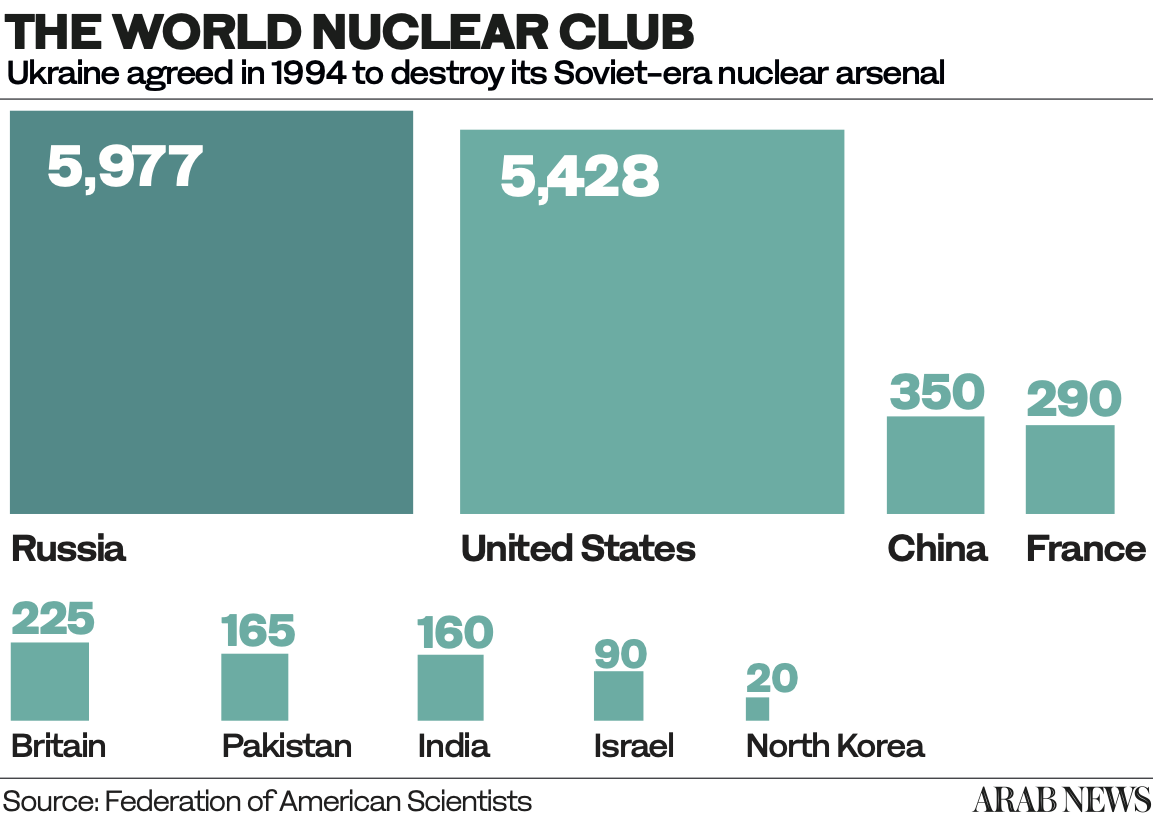
If the West cannot guarantee Kyiv’s security in return for furthering the campaign for nuclear disarmament, then why would unpopular, nondemocratic governments put their trust in similar security assurances in return for dismantling their stockpiles (or pledging to never develop such weapons) in the future?
“In a general sense, the invasion of Ukraine does reinforce the utility of nuclear weapons in protecting states. Ukraine gave up its nuclear weapons and was attacked, yet the far more vulnerable Baltic states are (for now, anyway) safe because of NATO’s nuclear guarantee,” Kyle Orton, an independent Middle East analyst, told Arab News.
“Take the Gaddafi precedent. Had he retained his nuclear program and completed it, such weapons could not have prevented a rebellion from erupting against him in 2011. But the stark truth is it could have prevented NATO support for the rebellion, and without external support, it might well have failed, and Gaddafi would have survived,” he said.
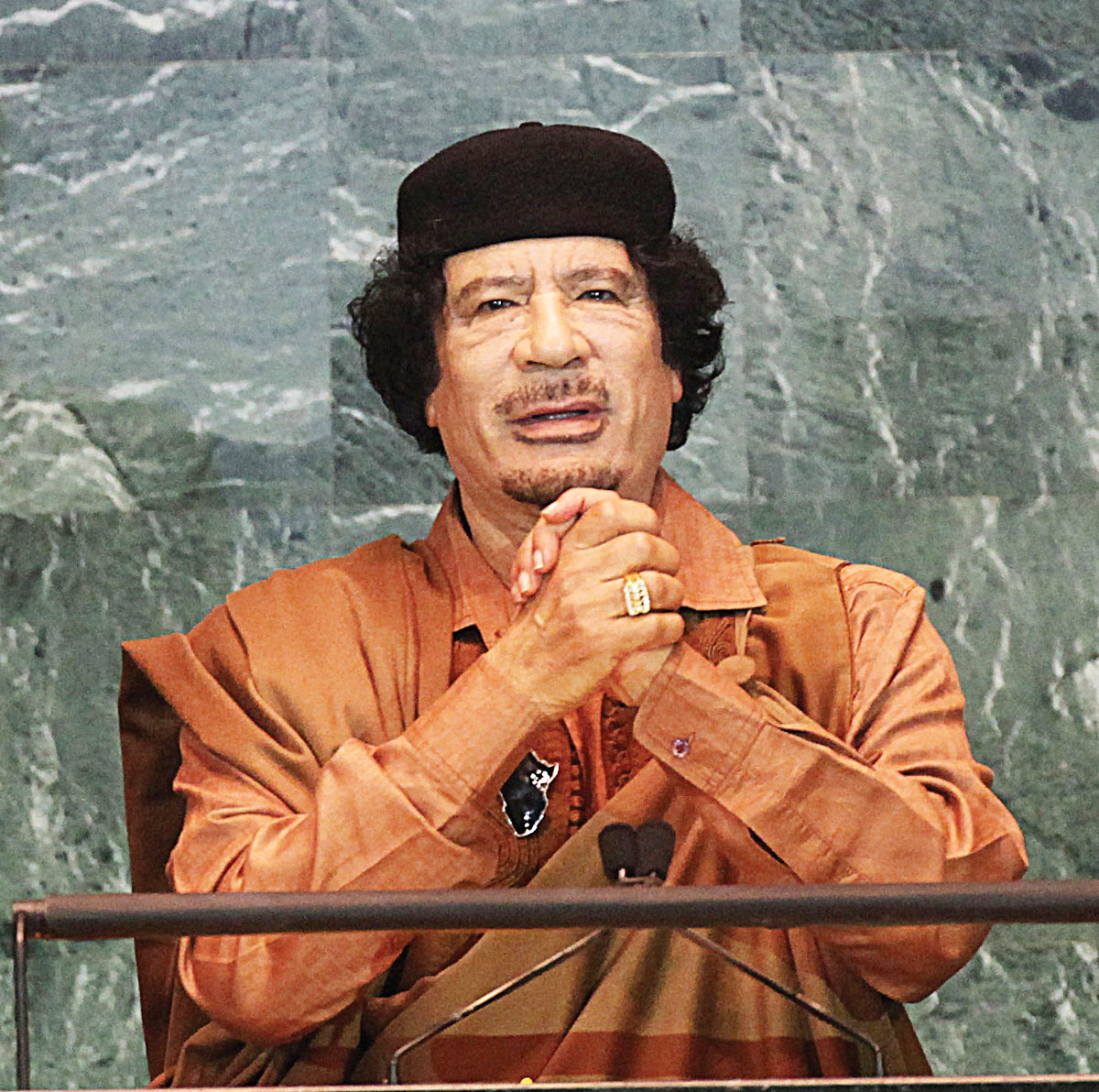
The late Libyan leader Moammar Gadhafi delivers an address to the United Nations General Assembly in New York City on Sept. 23, 2009. (AFP file photo)
Shashank Joshi, defense editor at The Economist, also believes that “the violation of the Budapest Memorandum does show that such diplomatic agreements, and particularly negative security assurances — the promise that you won’t attack someone — are difficult if not impossible to enforce over a period of decades.
“Though Gaddafi did not receive such assurances explicitly, NATO’s role in facilitating the collapse of his regime, which culminated in his murder, is also a precedent that would-be nuclear authoritarian states will keep in mind,” Joshi told Arab News.
In return for surrendering his “weapons of mass destruction” stockpile, Gaddafi was promised better relations between Libya, then an impoverished pariah state, and the West, as well as the lifting of economic sanctions against his country. Nevertheless, by 2009 he seemed to have come to regret the decision, lamenting on a visit to Italy: “We had hoped Libya would be an example to other countries … but we have not been rewarded by the world.”
In Joshi’s opinion, while such precedents “probably make it harder to secure the disarmament of North Korea, it’s important to bear in mind that Pyongyang probably would not disarm even if it did have those guarantees.” By all accounts, Kim Jong-un, and his father before him, leaders of arguably one of the most isolated and secretive countries on the planet today, took note of the Gaddafi episode.

North Korean leader Kim Jong-Un (C) visits a drill for ballistic missile launch by the Korean People's Army on July 21, 2016. (KCNA VIA KNS / AFP)
Now, the West’s collective failure to match its words with action, in the case of a country as like-minded and globally integrated as Ukraine, could serve to further reduce the already unlikely prospect that Pyongyang would ever seriously consider nuclear disarmament in return for international guarantees and sanctions relief.
That said, could the Ukraine fiasco also impact the ongoing negotiations between Iran and the international community to revive the 2015 nuclear accord? Iran now has an estimated nuclear breakout time as short as five weeks, meaning it could build a bomb in that time frame if it decides to do so.
It is unclear if the undoubted failure of the Budapest Memorandum has further convinced some in Tehran that restoring the JCPOA is a futile endeavor. Orton, for one, is highly skeptical that the Ukraine crisis has, or will have, any significant bearing on Iran’s decision making vis-a-vis its nuclear program.
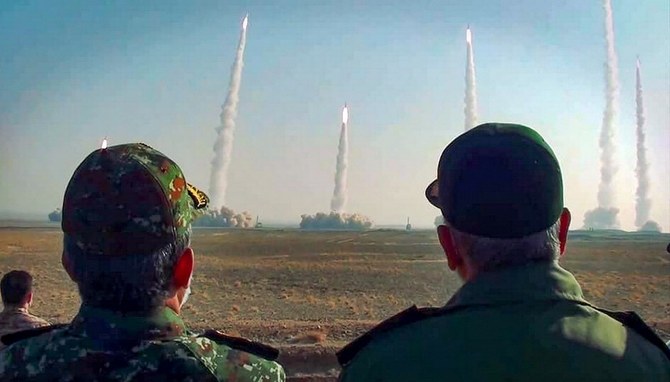
Iran's Revolutionary Guard Corps chief Hossein Salami watching a launch of missiles during a drill last year. (AFP/File)
“The invasion of Ukraine has only an indirect bearing on the Iran nuclear talks, really,” he told Arab News. “Russia and the clerical regime are strategic partners, so when Russia feels emboldened against a weak and ineffective West on the strength of its Ukraine conquest, it seemingly reinforces the argument for even more Iran-friendly terms for the nuclear deal.”
Orton added: “But it’s not really a precedent or anything: Tehran’s advance toward the bomb is its own thing, for its own reasons, with its own timeline.”
Analysts further say that it is important to note that if Iran ultimately does opt to develop nuclear weapons, it may not only use them to entrench the regime’s power and deter external threats.
“Much of the debate around Iran’s nuclear program is centered on the question of whether Iran would develop nuclear weapons to use to coerce its neighbors into submitting to it, rather than in defense of Iran,” Nicholas Heras, deputy director of the Human Security Unit at the Newlines Institute for Strategy and Policy, told Arab News.
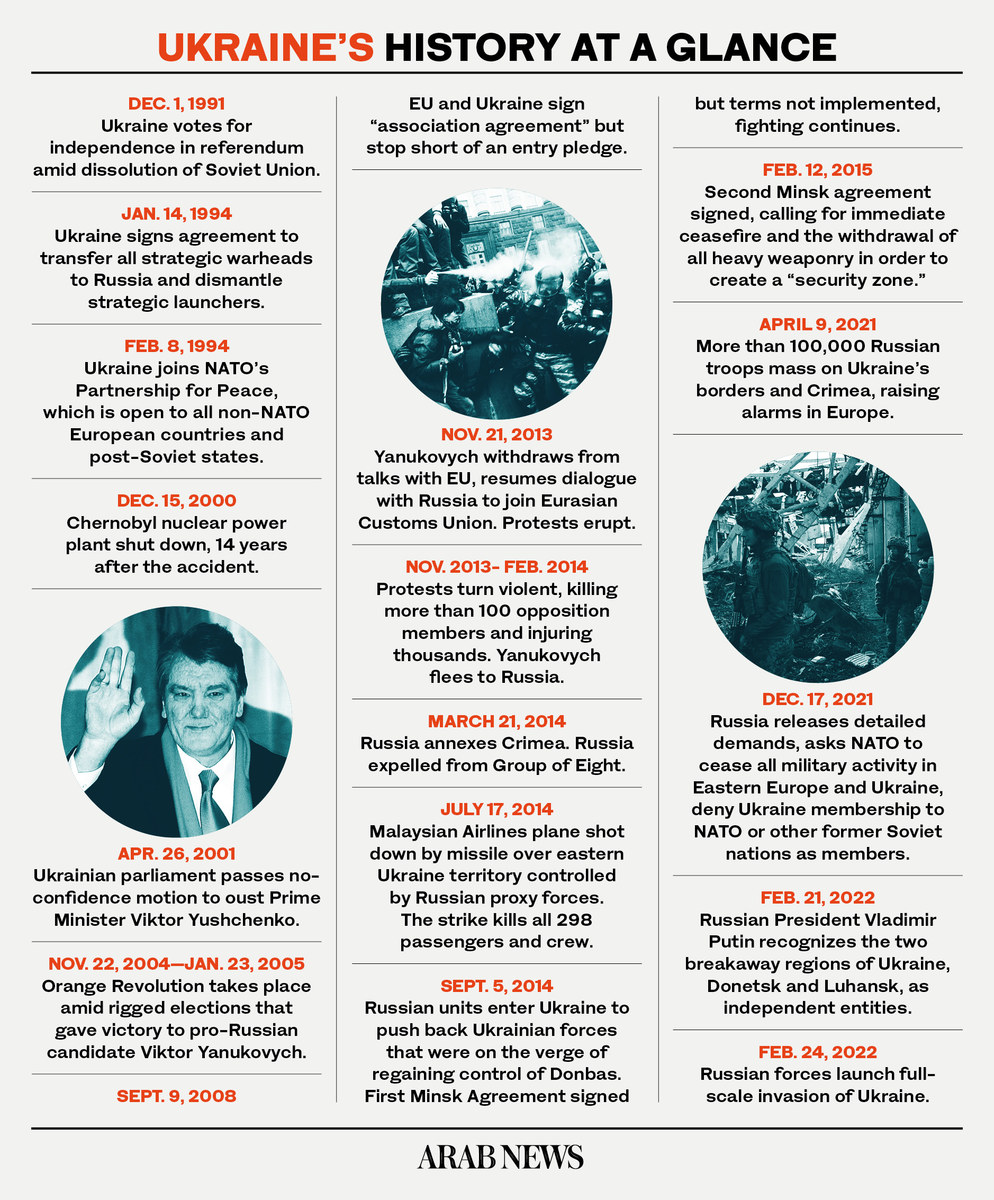
Either way, the regime in Tehran could conclude that developing nuclear weapons is worth the consequences and the risks.
Orton says that even though there are “real costs” for states that “overtly cross the nuclear threshold,” such as North Korea, some countries have concluded that those costs are worth paying.
“India, Pakistan and Israel have had their status and security enhanced by nuclear weapons,” he said: “You can run a global menagerie of Islamic radicals who kill thousands of Western troops, but you are shielded from the cost because of your nuclear coercive diplomacy.”
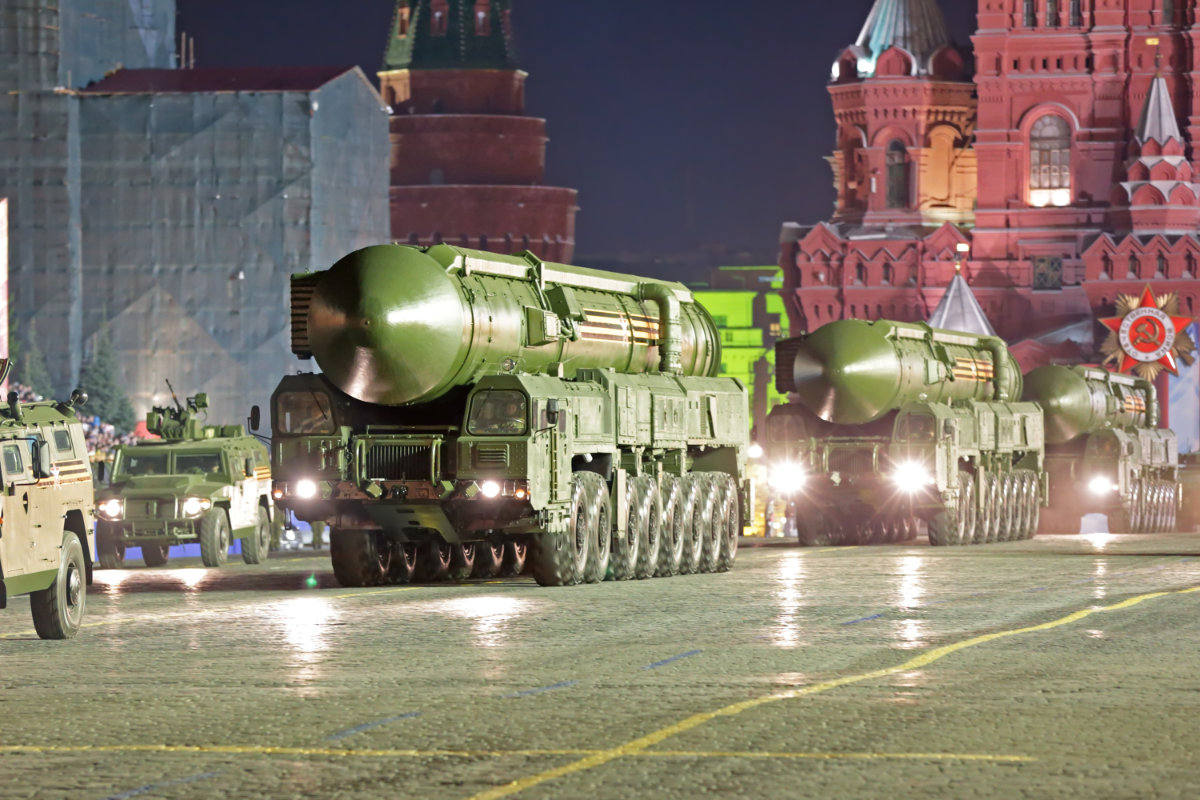
Russia's RS-24 Yars, a MIRV-equipped, thermonuclear weapon intercontinental ballistic missile, aredisplayed during a World War II victory celebration in Moscow. (Shutterstock photo)
Orton summed up the argument this way: “The incentives we have set, unfortunately, are for states to gain nuclear weapons and hold on to them. Technical expertise, money, state intentions and vulnerability to US sanctions seem likely to be the main constraints on proliferation going forward, not UN-blessed diplomatic instruments.”
In much the same vein, Heras described nuclear weapons as “the most effective deterrent threat against invasion that any state could possess in the modern world.”
“All nuclear weapons-possessing states have clear national security strategies that permit the use of these weapons to defend themselves,” he told Arab News. “This is a universal fact of statecraft in our modern world.”
In the final analysis, Heras said, the debate over nuclear weapons springs from the concern that the more states, or even nonstate actors, that possess them, the greater the likelihood is of such weapons being used in future conflicts.


